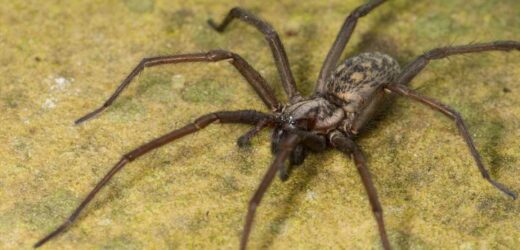IF you've been terrified by the sight of ginormous spiders invading your house this week, you're far from alone.
Dozens of Brits have flooded social media with pictures of freakishly huge creepy crawlies terrorising their homes as we head into cooler temperatures.
They are taking refuge in our homes so they can mate and multiply – meaning there could be several of them in your house at the same time.
Their mating season begins in the second week of September and ends by the first week of October.
Male spiders often come into houses in search of females that have remained lurking indoors in places such as bathrooms and kitchen cabinets.
Here, we look at what these giant spiders are, and pest controller Stuart Halliday gives his tips on how to get rid of them for good.
READ MORE ON SPIDER INVASION
UK spiders: The 24 British spiders you’re most likely to find in your house
I’m a pest controller – how to protect every inch of your home from spiders & bugs
Why are house spiders so big?
Many different spider species will invade our homes this autumn, but the giant house spider is the one you will see most often.
They live in sheds, attics, homes and out-buildings and can survive for several months without any food or water.
They can have leg spans of up to 12cm and are seen all year round but mate in the autumn time.
Entomologist Brian Eversham told ITV news there is a simple explanation for why they appear so big – that they grow during the spring and pop up this time of year as adults.
"This happens every year – during the spring time they are often quite small, and come late summer and adult, the spiders are adults," he said.
"They are fast moving, so they are the ones that people tend to notice. The females, quite sensibly, sit quietly in a corner of a room in their web, catching insects. People almost never notice that they've got female house spiders, tucked away in a shaded corner.
"The males go walking around, looking for the females, and that's when people tend to notice them. People think that there are suddenly a lot more, but it's just that they have started behaving differently."
Although, this spider is called the 'giant' spider, it's not the biggest in the UK.
Most read in News
'Gunman' arrested on suspicion of murdering Olivia, 9, shot dead in her home
Secret plans for Queen to appoint new PM at Balmoral – not Palace
Car ploughs into group of people on busy high street leaving five injured
I won the lottery with my girlfriend but she left me and took all the money
The cardinal spider is the largest spider across the British isles.
Otherwise known as Tegenaria parietina, some of these spiders have been recorded to have a leg span of 12cm.
How long do giant house spiders live?
It normally lives for two or three years, but lifetimes of up to six years have been observed.
While the female only leaves its nest to feed, males can often be seen wandering around houses during the late summer and early autumn looking for a mate.
This so-called "spider season" normally begins in the first two weeks of September and ends by the first week of October.
How to get rid of giant house spiders in the UK
Keeping your house clean is the most effective way to deter spiders. Dust and vacuum any spider webs or egg sacs (which will be ball shaped, and often hidden in the web) waiting to hatch.
Spiders will be less eager to return when their offspring and habitats have been removed. If you do this as soon as you spot them, it will make cleaning a whole lot easier.
Top of the list and perhaps the easiest (and most fragrant) is to use peppermint oil to deter our eight-legged friends.
After cleaning your home, you can mix up a two-part solution by adding around 20 drops of peppermint oil to a bottle of water.
Simply pour this into a spray bottle and spritz all around your house.
Citrus and eucalyptus are also good alternatives.
You can peel lemons and oranges and leave the peel in places where spiders might like to hide to put them off, but replace it regularly as the aroma won’t last forever.
Another simple way to stop the crawlies getting in is to seal up any cracks around your doors and windows, according to pest control expert Stuart Halliday.
"Sometimes if you have your windows changed, or if you live in an older property, there can be gaps both on the inside and outside meaning spiders and other insects can get in," he said.
Read More on The Sun
I’m a size 22 – I did an H&M haul so you don’t have to
My neighbour parks TWELVE cars on our street – we’re struggling to find a space
"You should make sure these are sealed up and then to help keep the spiders out put lemongrass cleaners or oil around windows and doors as they don't like the smell.
"Also growing basil, thyme and rosemary on windowsills will keep the pests out and deter wasps, woodlice and other small crawlies."
Source: Read Full Article














